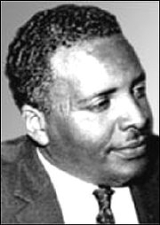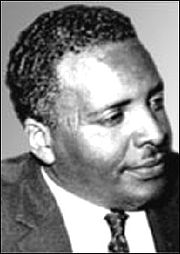
Sirr Al-Khatim Al-Khalifa
Encyclopedia
Sirr Al-Khatim Al-Khalifa Al-Hassan ' onMouseout='HidePop("35136")' href="/topics/Ed_Dueim">Ed Dueim
- February 18, 2006) was a Sudanese politician
, ambassador
and an elite educator. Famous for his great legacy in education and founding prints for Ministry of Education in Sudan, and as the Prime Minister in the October Regime
.

to Al-Khalifa Hassan Ahmed and Nafisa Al-Fakki Alabead. Descending from the Al Jalain tribe, his father migrated from Shendi
to Ed Dueim and was appointed as khalifa
of Al-Khatmiya.
In the early 1920s he attained his primary education at Ed Dueim Rural School and Berber Intermediate School. In 1937 he graduated from Gordon Memorial College
studying Teachers Education. Al-Khalifa became a teacher at Bakht Arrida from 1938 till 1944, until he moved to Great Britain to continue his education.
In 1944 Al-Khalifa furthered his education by attending Exeter College, University of Oxford
. In 1946 he returned to Sudan to resume his teaching job at Bakht Arrida.
. After seven years of success at the job, he was promoted to become Assistant Director of Education for Southern Provinces, the highest educational position in the region. During this time, he increased the number of schools and introduced the Arabic language
in the region. Spending 10 years in South Sudan, spreading education and relating to the once-totally-closed South, he became a very favorable and respected character in the whole of Sudan, South and North.
). He spent two years at the job, and was nicknamed "Father of Technical Education" in Sudan, since he devoted great effort and time for this newly established technical school.
to dissolve the government and prepare for civilian rule.
Al-Khalifa was nominated by the Umma Party as prime minister for a transitional government to prepare for civilian rule. Many agreed upon the nominee, others including the Sudanese Communist Party
(SCP) strongly disagreed due to his political inexperience and their nominees including Abdin Ismail and Jaafar Karrar. After several meetings between the different parties, Al-Khalifa was appointed as prime minister for the transitional government.
The Al-Khalifa regime was very eager to address, tackle and find peaceful solutions for the southern problem. With party members holding few positions, Southern politicians were allowed positions that were deemed as Northern. Clement Mboro became the first Southern to hold the position of Minister of Interior.
However, the conference reached a deadlock and was concluded with the establishment of Twelve-Men Committee, consisting of the participating political parties. Al-Khalifa was forced to resign and the government promised to schedule elections by June 1965. With a rushed elections conducted in the North excluding the South for security reasons, this ended the transitional government of Al-Khalifa and started the second democratic phase of Sudan under Mohamed Ahmed Mahjub.
seized power, Al-Khalifa was bluntly informed about his end of service and stripped of his diplomatic passport. He had to report immediately to Khartoum. Some believe that this blunt telex was a reply from Babiker Awadallah, former chief justice and new prime minister, and Nimeiry’s regime to Al-Khalifa’s betrayal of October Revolution by rushing the 1965 elections thus handing power to Umma-PDP parties. After performing the diplomatic farewell to the Queen, Al-Khalifa returned to Khartoum in the beginning of June, 1969.
The day after his death, Al-Khalifa's burial at Al-Bakri Cemetery on February 19, 2006, was attended by thousands of his colleagues, politicians, educators and students.
Ed Dueim
-References:...
- February 18, 2006) was a Sudanese politician
Politician
A politician, political leader, or political figure is an individual who is involved in influencing public policy and decision making...
, ambassador
Ambassador
An ambassador is the highest ranking diplomat who represents a nation and is usually accredited to a foreign sovereign or government, or to an international organization....
and an elite educator. Famous for his great legacy in education and founding prints for Ministry of Education in Sudan, and as the Prime Minister in the October Regime
History of Sudan (Independent Sudan)
This article details the period of Independent Sudan, January 1, 1956 to May 25, 1969, in the history of Sudan. The Azhari government temporarily halted progress toward self-determination for Sudan, hoping to promote unity with Egypt...
.

Early life and education
Al-Khalifa was born in Ed DueimEd Dueim
-References:...
to Al-Khalifa Hassan Ahmed and Nafisa Al-Fakki Alabead. Descending from the Al Jalain tribe, his father migrated from Shendi
Shendi
Shendi or Shandi is a town in northern Sudan, situated on the east bank of the Nile 150 km northeast of Khartoum. Shandi is also about 45 km southwest of the ancient city of Meroe. Located in the River Nile wilayah, Shandi is the center of the Ja'aliin tribe and an important historic...
to Ed Dueim and was appointed as khalifa
Caliph
The Caliph is the head of state in a Caliphate, and the title for the ruler of the Islamic Ummah, an Islamic community ruled by the Shari'ah. It is a transcribed version of the Arabic word which means "successor" or "representative"...
of Al-Khatmiya.
In the early 1920s he attained his primary education at Ed Dueim Rural School and Berber Intermediate School. In 1937 he graduated from Gordon Memorial College
Gordon Memorial College
Gordon Memorial College is an educational institution in Sudan. It was built between 1899 and 1902 as part of Lord Kitchener's wide-ranging educational reforms....
studying Teachers Education. Al-Khalifa became a teacher at Bakht Arrida from 1938 till 1944, until he moved to Great Britain to continue his education.
In 1944 Al-Khalifa furthered his education by attending Exeter College, University of Oxford
Exeter College, Oxford
Exeter College is one of the constituent colleges of the University of Oxford in England and the fourth oldest college of the University. The main entrance is on the east side of Turl Street...
. In 1946 he returned to Sudan to resume his teaching job at Bakht Arrida.
Trip to South Sudan
In 1950, after the abandonment of the Southern Policy, a colonial policy that isolated Southern Sudan from education and economic development, Al-Khalifa was appointed as a Provincial Education Officer at Equatoria Province in JubaJuba, Sudan
Juba is the capital and largest city of the Republic of South Sudan. It also serves as the capital of Central Equatoria, the smallest of the ten states of South Sudan. The city is situated on the White Nile and functions as the seat and metropolis of Juba County.- Population :In 2005, Juba's...
. After seven years of success at the job, he was promoted to become Assistant Director of Education for Southern Provinces, the highest educational position in the region. During this time, he increased the number of schools and introduced the Arabic language
Arabic language
Arabic is a name applied to the descendants of the Classical Arabic language of the 6th century AD, used most prominently in the Quran, the Islamic Holy Book...
in the region. Spending 10 years in South Sudan, spreading education and relating to the once-totally-closed South, he became a very favorable and respected character in the whole of Sudan, South and North.
Return to North Sudan
In 1962, Al-Khalifa was appointed as a dean of Khartoum Technical Institute (now Sudan University of Science and TechnologySudan University of Science and Technology
Sudan University of Science and Technology, or SUST, is one of the main public universities in Khartoum, Sudan.It is a member of the Federation of the Universities of the Islamic World....
). He spent two years at the job, and was nicknamed "Father of Technical Education" in Sudan, since he devoted great effort and time for this newly established technical school.
1964 Revolution and political career debut
In 1964, the Abbud regime was facing numerous instabilities that led to a major strike from the different working sectors of the society. The strike, known as the October Revolution, led to rioting and numerous deaths and forced President AbbudIbrahim Abboud
El Ferik Ibrahim Abboud was a Sudanese president, general, and political figure. A career soldier, Abboud served in World War II in Eritrea and Ethiopia. In 1949, Abboud became the deputy Commander in Chief of the Sudanese military. Upon independence, Abboud became the Commander in Chief of the...
to dissolve the government and prepare for civilian rule.
Al-Khalifa was nominated by the Umma Party as prime minister for a transitional government to prepare for civilian rule. Many agreed upon the nominee, others including the Sudanese Communist Party
Sudanese Communist Party
The Sudanese Communist Party is a Communist political party in the Republic of Sudan. Founded in 1946, it was a major force in Sudanese politics until 1971, when military ruler Gaafar al-Nimeiry launched a wave of repression against the party after a failed coup implicated...
(SCP) strongly disagreed due to his political inexperience and their nominees including Abdin Ismail and Jaafar Karrar. After several meetings between the different parties, Al-Khalifa was appointed as prime minister for the transitional government.
The Al-Khalifa regime was very eager to address, tackle and find peaceful solutions for the southern problem. With party members holding few positions, Southern politicians were allowed positions that were deemed as Northern. Clement Mboro became the first Southern to hold the position of Minister of Interior.
1965 Round Table Conference
Al-Khalifa called upon establishing the Round Table Conference with the presence of 24 Southern politicians and 18 Northern party representatives to address the problem of the South. The conference was originally scheduled in Juba between March 16–29, 1965; however, several burnings and rampages in Juba signaled the migration of the conference to Khartoum.However, the conference reached a deadlock and was concluded with the establishment of Twelve-Men Committee, consisting of the participating political parties. Al-Khalifa was forced to resign and the government promised to schedule elections by June 1965. With a rushed elections conducted in the North excluding the South for security reasons, this ended the transitional government of Al-Khalifa and started the second democratic phase of Sudan under Mohamed Ahmed Mahjub.
Diplomatic break from politics
Al-Khalifa was appointed as ambassador to Italy in 1966. In March 1968, he was transferred to become ambassador to Britain. On May 25, 1969, when Gaafar NimeiryGaafar Nimeiry
Gaafar Muhammad an-Nimeiry was the Nubian President of Sudan from 1969 to 1985...
seized power, Al-Khalifa was bluntly informed about his end of service and stripped of his diplomatic passport. He had to report immediately to Khartoum. Some believe that this blunt telex was a reply from Babiker Awadallah, former chief justice and new prime minister, and Nimeiry’s regime to Al-Khalifa’s betrayal of October Revolution by rushing the 1965 elections thus handing power to Umma-PDP parties. After performing the diplomatic farewell to the Queen, Al-Khalifa returned to Khartoum in the beginning of June, 1969.
Later life
In 1973 Nimeiry appointed Al-Khalifa as Minister of Education. He assumed this position for two years, when he was appointed in 1982 as President Advisor on Educational Affairs until the end of Nimeiry’s era in 1985.The day after his death, Al-Khalifa's burial at Al-Bakri Cemetery on February 19, 2006, was attended by thousands of his colleagues, politicians, educators and students.
Trivia
- Succeeded by his son Hassan (named after his father), and four daughters Nafisa (named after his mother), Sulafa, Sara and Sawsan
- He inaugurated and was the first to pitch a ball in Al Merreikh Stadium in 1965.
- He was a fan of Ahmed Al-Mustafa, post Haqeeba singer
- He was one of the authors of the famous geography books in Sudan primary school syllabus, Sobol Kasb Al-ayash fe es Sudan, (Means of earning a living in Sudan). This book explored the different regions of Sudan, introducing the dialects and customs of each region.

